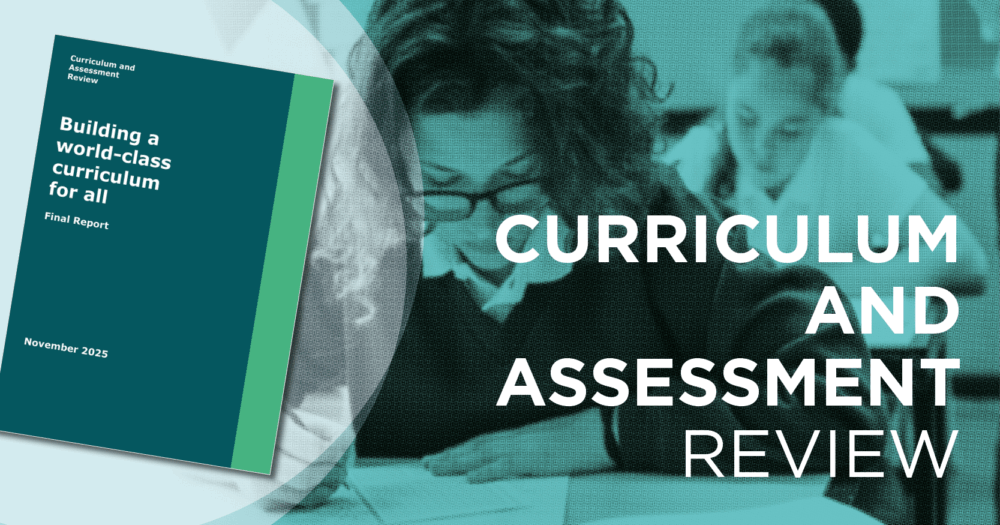The government should scrap the EBacc accountability measure, introduce year 8 “diagnostic” tests in English and maths and aim to reduce GCSE exam time by at least 10 per cent, the curriculum and assessment review has recommended.
Professor Becky Francis’s review, commissioned last year by the incoming Labour government, also calls for the key stage 2 grammar, punctuation and spelling test to be replaced.
The review also made recommendations for changes to individual subjects. You can read our full round up of those here.
But here are the review’s overall recommendations and those relating to accountability, assessment and post-16.
The recommendations are in most cases for the government, but also call for work with Ofqual and the Standards and Testing Agency where needed.
You can also view the curriculum review in full here.
The 5 overarching recommendations
- Introduce an oracy framework to complement the existing frameworks for reading and writing (Accepted by DfE)
- Review and update all programmes of study. Where appropriate, the corresponding GCSE subject content to include stronger representation of the diversity that makes up our modern society, allowing more children to see themselves in the curriculum (DfE accepted recommendation to update programmes of study, and referred to diversity later in its response)
- Develop the national curriculum as a digital product that can support teachers to navigate content easily (Accepted by DfE)
- Develop a programme of work to provide evidence-led guidance on curriculum and pedagogical adaptation (as well as exemplification) for children and young people with SEND (Accepted by DfE)
- Involve teachers in the testing and design of programmes of study as part of the drafting process and ensure the national curriculum is ambitious but teachable within a typical timetable (Accepted by DfE)
The 7 proposed curriculum principles (All accepted by DfE)
- The refreshed national curriculum must be an aspirational, engaging and demanding offer
- The refreshed national curriculum should retain a knowledge-rich approach
- The national curriculum should be constructed so that it supports children and young people to master core concepts, ensuring sufficient space to build knowledge and deepen understanding
- Curriculum coherence should be an organising principle for curriculum drafters and support the selection and prioritisation of content
- Foundation subject content should specify the essential substantive knowledge and skills which should be taught
- The refreshed national curriculum should ensure the professional autonomy of teachers is maintained
- The national curriculum is for all our children and young people. As such, it should reflect our diverse society and the contributions of people of all backgrounds to our knowledge and culture
Accountability: Ditch Ebacc, keep progress 8
- Remove the EBacc performance measures and the associated EBacc entry and attainment headline accountability measures (Accepted by DfE)
- Retain Progress 8 (and Attainment 8) with no changes to its structure or subject composition, but rename the current EBacc buckets ‘Academic Breadth’ (Not accepted, see here)
- Continue to develop initiatives related to similar schools, with a particular emphasis on supporting inclusive approaches within accountability measures (Accepted by DfE)
Key stage 1 tests: Encourage optional SATs take-up
- Find ways to encourage take-up of optional Key Stage 1 assessments (Accepted by DfE)
- Explore approaches for assessing progress for the small minority of pupils with certain SEND needs that make the phonics screening check inaccessible (Accepted by DfE)
Key stage 2: Replace grammar test, explore making headline measure
- Explore if access arrangements can be refined for pupils with certain SEND that make the multiplication tables check inaccessible (Accepted by DfE)
- Develop an improved teacher assessment framework and include a greater focus on writing fluency (Accepted by DfE)
- Review external moderation processes and look to strengthen peer moderation between schools (Accepted by DfE)
- Replace the current grammar, punctuation and spelling (GPS) test with an amended test, which retains some elements of the current GPS test but with new tasks to better assess composition and application of grammar and punctuation (Accepted)
- Once the new test is established in schools, the DfE may wish to consider whether the role of the test in accountability remain as stands, or whether any changes, such as including the new test in headline measures, should be explored (Not accepted)
Key stage 3: introduce English and maths tests
- Introduce diagnostic assessment for key components of maths and English to be taken during year 8 to support teachers to address students’ needs and ensure that they are well prepared to progress into key stage 4 (FYI, this is on top of the year 8 reading test the government has already pledged to introduce) (Not accepted – DfE says instead it will expect all schools to assess pupil progress in writing and maths in Year 8 and will support them to select the right products to do this)
- Commission the design and trialling of the test, with a view to making it mandatory if the pilots demonstrate that this is an effective approach (Not accepted)
Key stage 4 assessment: Reduce exam time by 10%(Accepted by DfE)
Volume
- Seek to reduce overall exam time by at least 10 per cent, focusing on assessment design choices to deliver this reduction, and going further than this where possible. This should be considered on a subject-by-subject basis, ensuring minimal impact on reliability, fairness and teaching and learning
- Introduce a design principle that considers of the volume of exam assessment as a priority. Explore a range of options within each subject to seek to minimise exam length
- Ensure that in implementing the above recommendations, each subject retains at least two assessment components
Method of assessment
- Continue to employ the principle that non-exam assessment should be used only when it is the only valid way to assess essential elements of a subject (Accepted by DfE)
- Ensure that assessment approaches continue to be derived from the nature and structure of subject content, ensuring that what is assessed reflects what is most important for students to learn and do (Accepted by DfE)
- Work closely with the wider education sector to explore how core aspects of subject content can be retained and assessed whilst managing and mitigating the risk of generative AI (Accepted by DfE)
- Continue to consider the full range of options for assessment methods, including non-exam assessment, where it would be necessary to mitigate the risks posed by generative AI (Accepted by DfE)
- Ensure that the DfE and Ofqual continue to work together to explore potential for innovation in on-screen assessment in GCSE, AS and A Level qualifications, particularly where this could further support accessibility for students with SEND and where this could reduce exam volume in the future (Accepted by DfE)
- Consider how awarding organisations can build accessibility into the design of new specifications for GCSEs, AS and A-levels (Accepted by DfE)
- Ensure that, when updating the maths and science GCSEs, subject experts evaluate each formula and equation to determine whether students should be required to memorise and recall it, or whether assessment should focus on their ability to apply it when provided (Accepted by DfE)
Our full curriculum review coverage:
News story: New national curriculum pledged from 2028
What ministers said: which recommendations will now become government policy?
Key policies round-up: Scrap EBacc, year 8 tests in English and maths, cut 10% from GCSE exam time
Subject-specific policy round-up: Mandatory citizenship, RE in the national curriculum and triple science entitlement:
Interview: Becky Francis on the big ideas in her curriculum review
16 to 19 education
- Introduce a revised third pathway at level 3 to sit alongside the academic and technical pathways. This pathway should be based on new V-levels (Accepted by DfE)
- Consider learners who have SEND or face other barriers to education to ensure that the qualifications are inclusive by design (Accepted by DfE)
- Continue to work closely with awarding organisations to reduce the assessment burden of T-level assessment in the context of scale up (Accepted by DfE)
- Introduce two separate pathways at level 2 (an occupational pathway and a pathway to level 3), each serving different purposes and designed specifically to meet these purposes and improve student outcomes (Accepted by DfE)
16 to 19 English and maths: strengthen accountability
- Strengthen the accountability system and explore opportunities to better incentivise effective practice across 16-19 providers (Accepted by DfE)
- Introduce new level 1 stepped qualifications for maths and English language at 16-19, to enable learners to make progress towards achieving level 2 in these GCSEs during 16-19 study (Accepted by DfE)
Future curriculum changes: limit full reviews, but introduce rolling ‘light-touch’ updates (Accepted by DfE)
- Limit the intervals between holistic curriculum reviews to approximately a decade
- Supplement holistic reviews with a rolling programme of light-touch minimalist updates of the national curriculum and its programmes of study
- Ensure that future reviews set clear objectives at the outset, adopt a rigorous evidence-led approach and undertake public consultation
- Ensure that future reviews strike an appropriate balance between external expert input and central coordination















Your thoughts